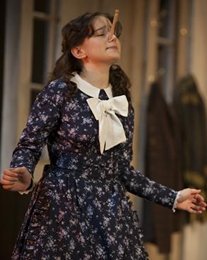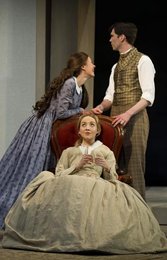The Gate Theatre tends to avoid obvious choices for its holiday shows (A Christmas Carol aside), instead settling on stage adaptations of much-loved literary classics. This year is no different as Louisa May Alcott’s Little Women, adapted by Anne-Marie Casey and directed by Michael Barker-Caven, receive a pleasant, though fairly straightforward, production. The story of the four March sisters coming of age at a time of great national and personal upheaval is touching and, indeed, inspiring. However, despite the charms of its talented cast, this adaptation of Alcott’s novel [incorporating both volumes, Little Women and Good Wives] suffers at times from a lethargic directorial approach that denies a passionate engagement with what are clearly compelling characters.
Alcott has made Casey and Barker-Caven’s jobs easy. She’s provided them with a gallery of lively characters, a tumultuous period in American history, and the fomenting of a political movement for women’s equality and independence in both the domestic and public spheres. If there wasn’t enough drama in the everyday life of New England’s March family, it’s certainly there in the historical crossroads at which the story takes place.
 The play opens in the midst of the American Civil War, with Robert ‘Pa’ March (Michael James Ford) on the front lines in Virginia as his four daughters are coming of age back north in Massachusetts, far from the war’s devastation. The girls have their own battles, though: Jo (Lorna Quinn), dreams of literary success and bemoans having been born a girl in a world that sees matrimony as a woman’s greatest ambition; oldest sister Meg (Kathy Rose O’Brien) aims to marry well; the sickly Beth (Jane McGrath) seeks to emulate her parents' charity work; and youngest sister Amy (Aisling Franciosi) is concerned that her nose isn’t developing in a properly attractive fashion. While these concerns may not seem like much in the face of a national bloodletting, the March girls find themselves continuing to contend with serious issues of love, undue expectations and the fight to determine one’s own destiny. It’s a deceptively simple narrative that defies quaintness, and it certainly doesn’t shy away from the complexities and contradictions of living and dying in the nineteenth-century.
The play opens in the midst of the American Civil War, with Robert ‘Pa’ March (Michael James Ford) on the front lines in Virginia as his four daughters are coming of age back north in Massachusetts, far from the war’s devastation. The girls have their own battles, though: Jo (Lorna Quinn), dreams of literary success and bemoans having been born a girl in a world that sees matrimony as a woman’s greatest ambition; oldest sister Meg (Kathy Rose O’Brien) aims to marry well; the sickly Beth (Jane McGrath) seeks to emulate her parents' charity work; and youngest sister Amy (Aisling Franciosi) is concerned that her nose isn’t developing in a properly attractive fashion. While these concerns may not seem like much in the face of a national bloodletting, the March girls find themselves continuing to contend with serious issues of love, undue expectations and the fight to determine one’s own destiny. It’s a deceptively simple narrative that defies quaintness, and it certainly doesn’t shy away from the complexities and contradictions of living and dying in the nineteenth-century.
However, the stakes the characters face during the course of the play are lessened here by the insistence on piling one dramatic event atop another and shading them at times with a similar bland emotionality. Though Beth’s illness is treated with a genuinely affecting tenderness and anxiety, in other instances the cast has been directed to play general emotional states rather than have an honest engagement with the story’s given circumstances. Casey's adaptation seems to have attempted to include any and all of its emotional set pieces into the script, helping the play to far surpass the two hour and fifteen minute run time advertised in the programme. A more considered and dramaturgically conscious approach would have been welcome, perhaps allowing a greater amount of narrative and character detail to emerge.
 Paul O’Mahony’s transformable set unfolds to reveal the story’s many settings, finding, with the help of Malcolm Rippeth’s lighting, a plethora of functional frames for settings ranging from the March’s sitting room to the bustling streets of New York. However, the halfhearted use of projection to express Jo’s flights of literary inspiration, or to stage Amy’s near drowning, comes across as ill-conceived attempts to bring a little flash to the sedate staging. Eimer Ní Mhaoldomhnaigh’s costumes are the real visual treat here, with the staid and stately conservatism of Civil War era dress recreated with great detail and grace. Barker-Caven’s sound design comes across as an afterthought, though, much of it taken from the soundtrack to Ken Burn’s film documentary, The Civil War.
Paul O’Mahony’s transformable set unfolds to reveal the story’s many settings, finding, with the help of Malcolm Rippeth’s lighting, a plethora of functional frames for settings ranging from the March’s sitting room to the bustling streets of New York. However, the halfhearted use of projection to express Jo’s flights of literary inspiration, or to stage Amy’s near drowning, comes across as ill-conceived attempts to bring a little flash to the sedate staging. Eimer Ní Mhaoldomhnaigh’s costumes are the real visual treat here, with the staid and stately conservatism of Civil War era dress recreated with great detail and grace. Barker-Caven’s sound design comes across as an afterthought, though, much of it taken from the soundtrack to Ken Burn’s film documentary, The Civil War.
While Barker-Caven’s direction may not always be on the mark, he has certainly displayed a good eye for casting. Quinn delivers a boisterously charming Jo, and Marty Rea is a treat as the mischievous and lovelorn Laurie, Jo’s childhood friend. O’Brien, Franciosi and McGrath infuse the March sisters with the bonds of affection, jealousy and sacrifice that can exist only between siblings. The supporting cast fills out their roles admirably, and while the production seems to lower expectations in the face of a holiday audience, thanks to the performers, this staging of Little Women shows a lot of heart.
Jesse Weaver was recently awarded a PhD in Theatre Studies from UCC, and is a playwright.